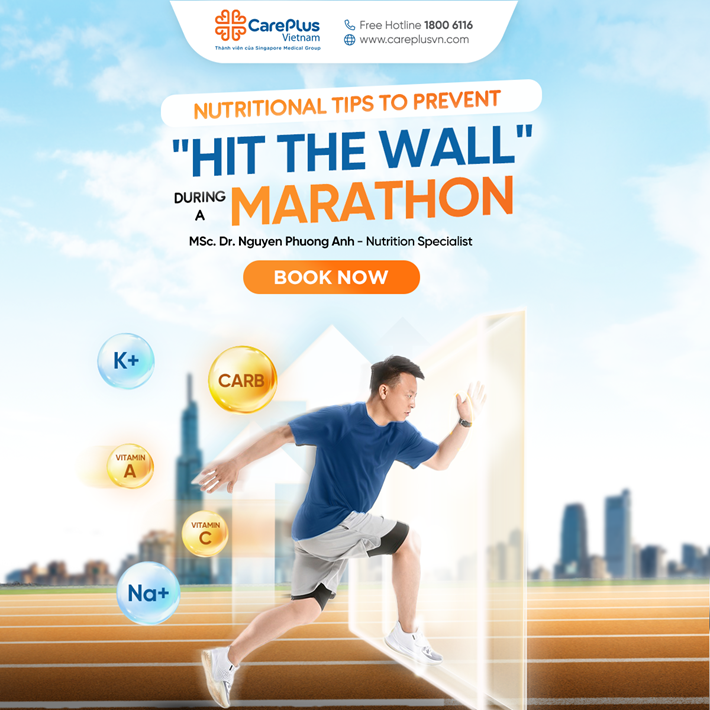NUTRITION TIPS TO PREVENT “HITTING THE WALL” DURING A MARATHON
"Hitting the wall" is a sudden fatigue condition that makes runners feel as if an invisible wall is stopping them, forcing them to rest. Read expert advice from CarePlus to prevent hitting the wall while running.

10/21/2024 9:53:11 AM
🏃 If you're passionate about running and often participate in marathons, you've probably heard the term "Hitting the wall." Though the wall is metaphorical, it vividly describes the pain, exhaustion, and sense of helplessness long-distance runners experience when struggling to continue their journey.
🤔 So, what exactly is “Hitting the wall,” and how can you prevent it? Let’s dive into this topic with insights from MSc. Dr. Nguyen Phuong Anh, a Nutrition Specialist at the CarePlus International Clinics!
1/ When does “Hitting the wall” occur?
⚡ "Hitting the wall" is when an athlete suddenly runs out of energy, as if hitting a barrier that prevents further progress, forcing them to stop or walk.
.jpg)
This condition typically results from two causes: either the runner hasn't trained enough to endure the physical demands of long-distance running, or they have depleted their carbohydrate stores, which is what the doctor will focus on here.
🍚 Glucose, a type of sugar present in the bloodstream, serves as a key energy source for the body. After a meal, carbohydrates, primarily found in staples like rice, noodles, potatoes, and corn, are absorbed into the bloodstream as glucose. The body stores glucose by binding glucose molecules together into glycogen, which is stored in the liver and muscles.
⚡ The two key energy storage systems in the body are glycogen stored in the liver/muscles and fat tissue. However, glycogen is the preferred fuel because it can be quickly broken down into glucose to provide energy. “Hitting the wall” happens when the body exhausts its glycogen reserves, despite having plenty of energy stored as fat! The glycogen stored in the liver and muscles provides about 2,000 calories, so runners often hit the wall around the 32-kilometer mark in a marathon.
2/ How can runners prevent “Hitting the wall”?
To avoid glycogen depletion, runners can adopt the following strategies:
🔸 Ensure a rich glycogen reserve in the liver and muscles by consuming enough carbohydrates. A low-carb diet can reduce glycogen storage. Carbohydrates should make up 55-65% of your total energy intake. For example, if your daily intake is 2,000 calories, then 1,100 to 1,300 calories should come from carbohydrates.
🔸 Train your muscles to store as much glycogen as possible.
🔸 Save glycogen by increasing fat usage for energy. Running at a moderate pace and ensuring sufficient oxygen supply helps the body use energy from both glycogen and fat stores. Conversely, running at a high intensity with insufficient oxygen forces the body to rely mainly on glycogen.
🔸 Drink carbohydrate-containing beverages (sports drinks) regularly during activities lasting more than an hour.
🔸 Eat carbohydrate-rich foods (about 60 grams of carbohydrates, equivalent to 165g of rice or 3 slices of sandwich bread) immediately after running.
✅ These simple and easy-to-follow tips from CarePlus experts can help you prepare and maintain your best condition for marathons. Plan a diet that meets your energy needs and training goals, listen to your body, and set appropriate running limits. If necessary, consult a nutritionist or an experienced sports coach.
👉 To book an appointment, please inbox us or call our free hotline at 1800 6116.
CAREPLUS INTERNATIONAL CLINICS
Associate of Singapore Medical Group
Hotline: 1800 6116
Email: info@careplusvn.com
Fanpage: CarePlus Clinic Vietnam